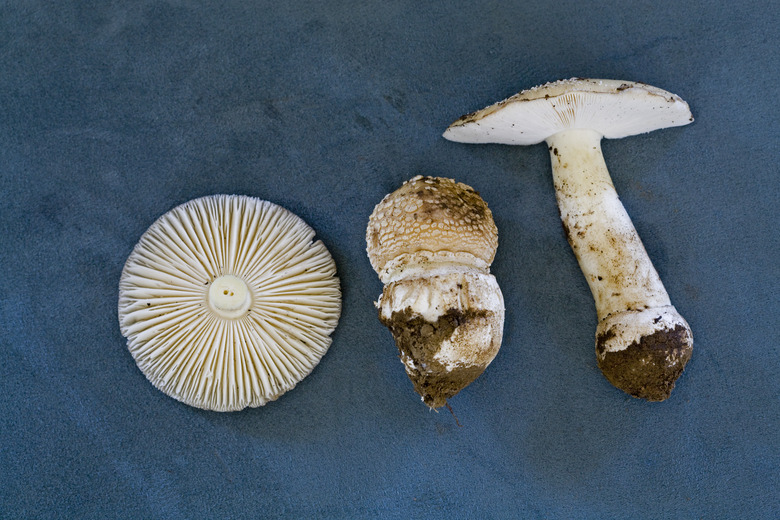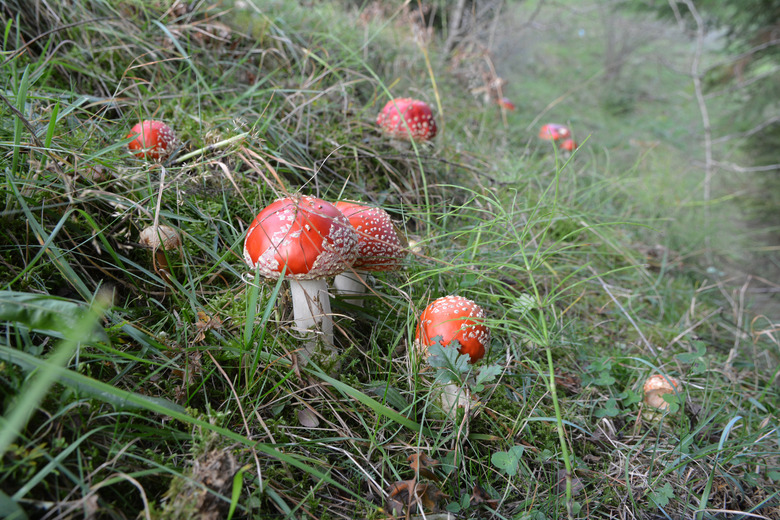Can Cats Eat Mushrooms?
If you live with a cat, you know the famous adage about their curious nature can be very true. If there's something to get into, your cat just might, especially if it's food. Or something that can be knocked off a high shelf. But especially food. Which might have you, like many pet owners, searching for answers to questions like, "can cats eat onions" or "can cats eat pizza?" or "can cats eat mushrooms?"
Let's look at one of those questions for your cat. Mushrooms are a staple food in many dishes for humans so it's not surprising that one might accidentally end up ingested by your cat. Whether it's a button mushroom or portobello mushroom slice found on a discarded slice of pizza or their non-culinary cousins, wild mushrooms, can cats have mushrooms?
Can cats have mushrooms?
Can cats have
mushrooms?
No, cats should not eat mushrooms. In general, most varieties of mushrooms are not recommended for cats and mushrooms are not safe for cats to eat, but there is an exception. Mushrooms bought in grocery stores, such as white cap, button mushrooms, portobello, or shiitake, can be fine for cats to eat in small quantities. Overall, however, it's best to avoid all fungi when it comes to your cat's diet and stick with cat food.
Cats are obligate carnivores, which means optimum cat health requires a meat-based diet. While they can have an occasional snack of human foods like some types of fruits and vegetables, including mushrooms, cat diets are not vegetarian or omnivorous, like many dogs. Vegetables are not necessary or even recommended for your cat's daily nutritional needs. This should be mainly made up of high-quality proteins from meats. Keeping your feline friend on a high-quality cat food diet will ensure that they are getting the antioxidants, amino acids, and proteins they need to stay healthy and active.
Are wild mushrooms safe for cats to eat?
Are wild mushrooms safe
for cats to eat?
No, wild mushrooms are not safe for cats to eat. There are countless types of mushrooms and many of them have been associated with toxicity in cats. While some wild mushrooms are non-toxic, if you notice or suspect that your cat has ingested any mushroom outdoors, you should consider it toxic and consult your veterinarian immediately.
If you live in an area where mushrooms thrive, or notice mushrooms or fungus in your yard, it's important that you first work to rid your yard of wild mushrooms if your pet will be in the area and secondly, that you understand the most common toxic mushrooms. The common families of toxic mushrooms are:
- Mushrooms in the Amanita family
such as the destroying angel or the death cap that contain amanitin toxins. - Certain mushrooms in the Lepiota
and Galerina familes such as false parasol, and green-spored parasol. - Mushrooms in the Inocybe
and Clitocybe that contain muscarine toxins such as funnel caps, blewits, and fiber caps. - Mushrooms in the Amanita family that
contain isoxazole toxins such as the fly agaric or the Amanita pantherina or panther cap. - Mushrooms that contain psilocybin
toxin (commonly referred to as magic mushrooms or psychedelic mushrooms), which
aren't lethal, but can cause fever and hallucinations in your cat.
What about store-bought mushrooms?
What about store-bought
mushrooms?
It's best that your cat's diet is primarily made of lean proteins, so keep snacking on store-bought mushrooms minimal. If your cat eats a mushroom while snacking on food left out by a forgetful human, there's no need to worry. Not all mushrooms carry a threat of mushroom poisoning for cats, and mushroom ingestion alone isn't a reason to worry. Store-bought mushrooms are not usually dangerous for your pet.
If your cat really has the taste buds for enjoying the umami flavor of store-bought mushrooms, stick with very small amounts of shiitake, button, cremini, or portobello mushrooms. It is also important to make sure that they are cooked thoroughly but leave out spices or seasonings as these can irritate your cat's stomach.
What to do if your cat eats mushrooms?
What to do if your cat
eats mushrooms?
If your cat got ahold of some wild mushrooms, look out for the following symptoms:
- vomiting
- diarrhea and gastrointestinal troubles
- constricted pupils
- slow heartbeat
- excessive salivation
- lethargy
- drooling
- lack of appetite
- black or tarry stools
- tremors
- elevated heart rate
- seizures
- disorientation or visual disturbances
- loss of balance
- aggression
- excessive thirst or urination
If your cat is experiencing any of these symptoms, seek veterinary assistance immediately. It is important to note that different mushroom toxins can affect different organ systems (such as liver failure, kidney failure, digestive system issues, or central or parasympathetic nervous system disruption) and these symptoms can impact your cat vary quickly within a half hour or take longer to become apparent, but often the damage can be already lethal before symptoms occur. That's why a quick response time and emergency veterinary visit is important.
The bottom line
The bottom line
In most cases, mushrooms are best to be avoided. The exception is a small amount of store-bought mushrooms, which should be fine for your cat. Wild mushrooms can be extremely poisonous and cause health issues for your cat. When a wild mushroom is spotted in your yard, it's best to assume it's toxic. If your cat ingests any type of mushroom from the outdoors, seek professional treatment as quickly as possible.

